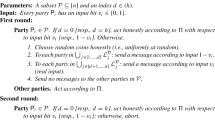Abstract
This paper presents a new Byzantine agreement protocol that toleratest processor faults usingO(t·logt) processors,t + 1 rounds,O(t 2 +o·t) total message bits (whereo is the number of processors that must decide), and messages of maximum size 1 bit. It is the first Byzantine agreement protocol that is simultaneously optimal in rounds, message bits, and message size. The new Byzantine agreement protocol is actually a protocol for the (slightly) more general Byzantine relay problem—a problem which we formulate in this paper. The Byzantine relay protocol is the result of a general recursive construction. Each step of the construction combines two smaller (in terms of number of faults tolerated) Byzantine relay protocols into one larger Byzantine relay protocol. The base case is a collection of very simple Byzantine relay protocols, each tolerant of a small constant number of processor faults. A key new feature of the protocol construction technique presented in this paper is that it does not add unproductive overhead rounds: given two constituent protocols that are optimal in the number of rounds, the composite protocol that is constructed is also optimal in the number of rounds.
Similar content being viewed by others
References
Bar-Noy, A., and Dolov, D. (1991), Consensus algorithms with one-bit messages,Distrib. Comput.4, 105–110.
Herman, P., Garay, J. A., and Perry, K. J. (1989), Recursive Phase King Protocols for Distributed Consensus, Technical Report CS-89-24, Department of Computer Science, Pennsylvania State University.
Coan, B. A. (1988), Efficient agreement using fault diagnosis, inProceedings of the 26th Allerton Conference on Communication, Control, and Computing, pp. 663–672.
Coan, B. A., and Welch, J. L. (1992), Modular construction of a Byzantine agreement protocol with optimal message bit complexity,Inform, and Comput.97, 61–85.
Dolev, D. (1982), The Byzantine generals strike again,J. Algorithms 3, 14–30.
Dolev, D., and Reischuk, R. (1985), Bounds on information exchange for Byzantine agreement,J. Assoc. Comput. Mach. 32, 191–204.
Fischer, M. J., and Lynch, N. A. (1982), A lower bound for the time to assure interactive consistency,Inform, Process. Lett. 14, 183–186.
Fischer, M. J., Lynch, N. A., and Merritt, M. (1986), Easy impossibility proofs for distributed consensus problems,Distrib. Comput. 1, 26–39.
Hadzilacos, V., and Halpern, J. Y. (1993), Message-optimal protocols for Byzantine Agreement,Math. Systems Theory, this issue, pp. 41–102.
Lamport, L., Shostak, R. E., and Pease, M. (1982), The Byzantine generals problem,ACM Trans. Program. Lang. Systems 4, 382–401.
Pease, M., Shostak, R. E., and Lamport, L. (1980), Reaching agreement in the presence of faults,J Assoc. Comput. Mach. 27, 228–234.
Perry, K. (1985), Early Stopping Protocols for Fault-Tolerant Distributed Agreement, Ph.D. Thesis, Department of Computer Science, Cornell University. (Also available as technical report TR-85-662.)
Turpin, R., and Coan, B. A. (1984), Extending binary Byzantine agreement to multivalued Byzantine agreement,Inform. Process. Lett. 18, 73–76.
Author information
Authors and Affiliations
Additional information
The work of Jennifer Welch was supported in part by NSF Grant CCR-9010730 and an IBM Faculty Development Award. This work was done while she was at the University of North Carolina at Chapel Hill.
Rights and permissions
About this article
Cite this article
Coan, B.A., Welch, J.L. Modular construction of an efficient 1-bit Byzantine agreement protocol. Math. Systems Theory 26, 131–154 (1993). https://doi.org/10.1007/BF01187076
Received:
Revised:
Published:
Issue Date:
DOI: https://doi.org/10.1007/BF01187076




